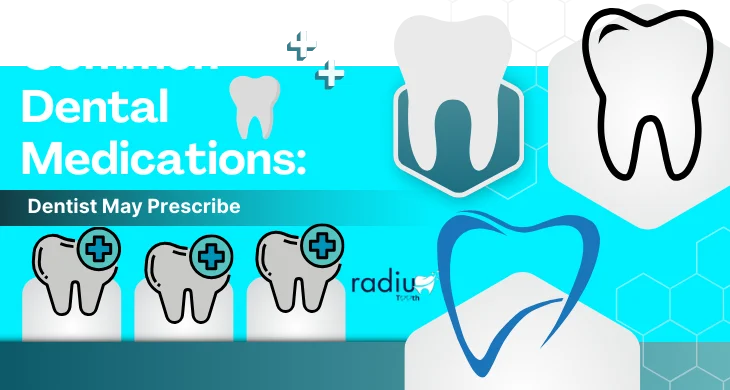Welcome to “Common Dental Medications: What Your Dentist May Prescribe.” In this guide, we delve into the world of dental drugs, offering insights into the medications that your dentist may prescribe to address a variety of oral health issues. Discover the vital role these drugs play in dental care and your overall well-being.
Pain Relief Medications:
Pain relief medications are essential in dentistry to manage post-procedural discomfort and alleviate toothaches and oral pain. Dentists may prescribe non-steroidal anti-inflammatory drugs (NSAIDs) like ibuprofen to reduce pain and inflammation. In cases of severe pain, stronger prescription medications, such as opioids or analgesics, might be recommended. These medications help patients cope with the discomfort associated with dental procedures, such as extractions or root canals. It’s vital to follow the dentist’s instructions precisely and be mindful of any potential side effects. Effective pain management ensures that patients can recover comfortably and maintain their oral health without undue distress.
Antibiotics for Oral Infections:
Antibiotics play a crucial role in dentistry to combat bacterial infections within the oral cavity, including conditions like gum disease (periodontitis) and dental abscesses. Dentists prescribe antibiotics to control and eradicate harmful oral bacteria, preventing the spread of infection and reducing associated symptoms like swelling and pain. These medications are often used in conjunction with dental treatments such as root canal therapy or gum scaling and planing. It’s essential to complete the full course of antibiotics as prescribed and follow the dentist’s recommendations to ensure the effective resolution of oral infections, thereby preserving oral health and preventing potential complications.
Oral Health Medications:
Oral health medications encompass a range of solutions aimed at maintaining and improving overall dental well-being. Prescription mouthwashes, for instance, help combat gum disease and reduce inflammation, promoting gum health. Medications can also address specific issues such as tooth sensitivity, providing relief from discomfort triggered by hot or cold stimuli. Additionally, oral gels and creams may be prescribed to manage conditions like canker sores and oral lesions, facilitating faster healing. These medications play a vital role in managing various oral health concerns and contributing to a more comfortable and healthy oral environment, ensuring the longevity of your smile.
Dental Pain Management:
Dental pain management is a fundamental aspect of ensuring patient comfort during various dental treatments. Dentists employ a range of methods and medications to alleviate discomfort and anxiety. Local anesthetics numb specific areas, ensuring pain-free procedures. For patients with dental anxiety, sedatives may be prescribed to induce a relaxed state. These approaches contribute to a positive dental experience, encouraging regular check-ups and treatments. By prioritizing pain management, dentists not only promote oral health but also foster a sense of ease and well-being, making dental care a more accessible and comfortable part of maintaining a healthy smile.
FAQ’S
Q1: What are the most common dental medications prescribed by dentists?
A1: Dentists commonly prescribe pain relief medications, antibiotics for infections, prescription mouthwashes, and oral gels for various dental conditions.
Q2: How do pain relief medications work in dental procedures?
A2: Pain relief medications, like local anesthetics, numb specific areas to ensure patients do not feel pain during dental procedures.
Q3: When are antibiotics prescribed for dental issues, and how do they help?
A3: Antibiotics are prescribed for bacterial oral infections, such as gum disease or dental abscesses, to combat and eliminate harmful bacteria.
Q4: What is the purpose of prescription mouthwashes in oral health?
A4: Prescription mouthwashes can promote gum health, reduce inflammation, and address specific oral conditions, such as tooth sensitivity or canker sores.
Q5: How do dentists manage dental pain and anxiety during treatments?
A5: Dentists use methods and medications like sedatives to ensure patient comfort, alleviate pain, and reduce anxiety during dental treatments.
Conclusion
In conclusion, “Common Dental Medications: What Your Dentist May Prescribe” emphasizes the critical role of medications in oral health care. These prescribed drugs are essential for pain management, infection control, and maintaining overall oral well-being. Dentists carefully consider each patient’s unique needs when prescribing medications, ensuring both comfort and effective treatment. By understanding the purpose and importance of these medications, individuals can actively participate in their dental care and experience a healthier, more comfortable smile. The guide underscores the collaborative relationship between dentists and patients in achieving optimal oral health outcomes through the responsible use of dental medications.

